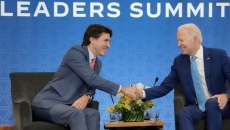The parliamentary budget officer says a single-payer universal drug plan would cost federal and provincial governments an additional$11.2 billion in the first year, and $13.4 billion in five years.
The PBO released a report on Thursday that provides an estimate for the cost of a pharmacare program between 2024-25 and 2027-28. It follows up on a previous costing the PBO published in 2017 for a pharmacare plan.
The new report calculates the incremental cost of the program, taking into account current spending by governments on public drug plans as well as revenue that would be generated from co-pays under a pharmacare plan.
The Liberals have promised to table pharmacare legislation this fall as part of the supply-and-confidence deal the government struck with the NDP.
Currently, Canadians pay for their prescription drugs through a mix of public plans, private insurance and out-of-pocket spending.
Excluding hospital drugs, the PBO says total prescription drug spending was $36.6 billion in 2021-22, a 28 per cent increase from 2015-16.
Of that amount, 46 per cent was covered by governments, 40 per cent by private insurers and 14 per cent was paid-out-of-pocket.
Total spending on prescription drugs under a single-payer, universal pharmacare plan is expected to be $33.2 billion in 2024-25, rising to $38.9 billion in 2027-28.
However the report also said such a plan would lead to economy-wide savings even though it estimates the use of prescription drugs would rise 13.5 per cent.
That's because the report assumes that the implementation of a single-payer universal plan would allow for better price negotiations, leading to lower drug prices.
The PBO estimates cost savings on drug expenditures of $1.4 billion in 2024-25, with that figure increasing to $2.2 billion by 2027-28.
Parliamentary budget officer Yves Giroux says the economy-wide savings are lower than what was estimated in the previous report published in 2017, namely because his office now estimates smaller savings from stronger drug price negotiations.
The economy-wide savings calculation does not take into account potential health care system savings from the rise in prescription drug use. Giroux said his office does not take on those kinds of cost-benefit analyses, which can be challenging to do.
In a statement Thursday, the Canadian Life and Health Insurance Association said shifting from private to public coverage for pharmaceuticals is a bad move.
"A single-payer program will spend unnecessary billions to disrupt existing workplace health benefit plans that are already making a larger number of prescription drugs more affordable for millions," said Stephen Frank, President and CEO of the Canadian Life and Health Insurance Association.
The implementation of a single-payer universal drug plan is expected to affect the private insurance industry, given there would be little need for private drug coverage.
Meanwhile, non-profit advocacy group The Council of Canadians welcomed the PBO's findings.
"The only real beneficiary of our current fragmented system is the pharmaceutical industry," a statement from the organization said.
"We urge the Liberal government to introduce legislation for a public, universal, comprehensive pharmacare program without delay."
The PBO report also looks at alternative coverage plans, as the federal government continues to work on what form a pharmacare program could take.
A plan that only covers catastrophic medicines, a term used to describe expensive drugs that could cause financial hardship, would cost governments an additional $400 million in the first year and $2 billion in five years.
Meanwhile, a plan that covers only essential medicines, which refers to medicines that address the priority health-care needs of a population, would cost an additional $2.4 billion in the first year and $12.1 billion in five years.
The federal New Democrats have rejected the first draft of the Liberals' pharmacare legislation, which NDP health critic Don Davies said the didn't meet expectations.
"It doesn't meet the New Democrats' red lines at this point," Davies said in an interview. "We're waiting for a next draft to come to us."
Davies said the NDP will accept nothing less than a commitment to pharmacare paid for and administered through the public single-payer system, though it doesn't have to happen all at once.





